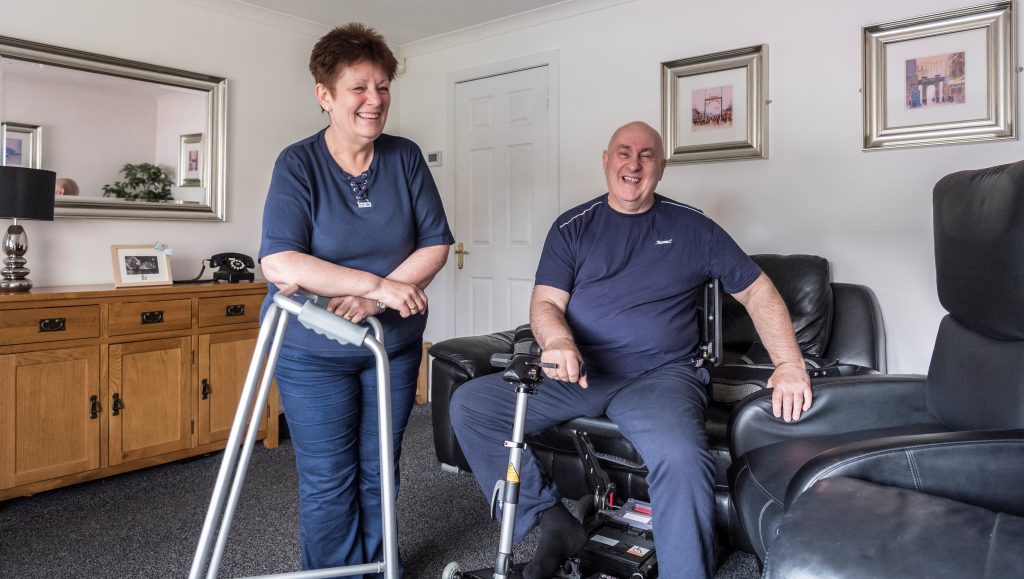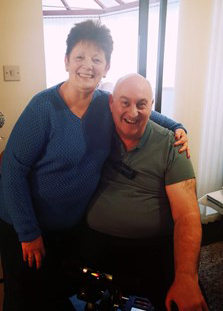What is MND
Find support
I have MND
I am supporting someone
Get involved
Research
About MND Scotland
What’s new?
© MND Scotland 2024
© MND Scotland 2024

Average life expectancy with MND is 18 months from diagnosis. Ian, a proud dad of three, tragically died just nine and a half months after he was diagnosed, before essential adaptations were put in place.
Today, we have launched a new report highlighting Scotland’s failing housing and adaptations system for people like Ian and Marie, and we are calling for Scottish and local government action now.

It was a devastating blow to Ian and his family.
Due to Ian’s deteriorating mobility, it quickly became clear that numerous adaptations were required for the home, including an external ramp, getting the patio doors replaced, a garage conversion to accommodate a wetroom and an appropriate hospital bed.
A former Police Constable, and latterly an Emergency Response Driver, Ian was a man who dedicated his working life to serving and helping others but unfortunately Ian felt that when he was in need of help, the support was not there.
Marie (63) said: “My husband Ian only lived for nine and a half months from diagnosis. That was precious time that we were supposed to spend making memories together. Instead, we spent most of it frustrated and stressed out, battling to get adaptations made to our home.”
While dealing with this devastating diagnosis, Ian and Marie found themselves having to fight for local authority support to get these vital adaptations, and to get planning permission passed for the garage conversion. This process was also slowed down considerably by the planning committee cancelling two meetings (which were six weeks apart).
Even at this difficult time, Ian tried to remain positive and used humour, telling MND Scotland at the time: “A couple of falls later and I’m still in one piece. I fell down my stairs on a Wednesday when the speech therapist was at my home and joked that I meant to do that on the Friday when the Occupational Therapist from Social Work Department was due to visit and make a decision on a stair lift.”
During the nine and a half months of Ian’s diagnosis, the family dealt with drawn out and time-consuming exchanges with their local council. Ultimately, this meant that no adaptations were fitted before Ian sadly passed away in October 2019.
Marie said: “Before Ian was diagnosed with MND, I had very little understanding about the condition or how rapidly it goes through a person and I think our local council have the same issue. They seem to have no real concept about just how little time somebody living with MND has or how urgently they need these adaptations to be made.
“Two huge problems we had was with having our garage converted and the ramp installed. We were told that we needed planning permission for the ramp, but we didn’t get permission so it went on and on and on. We were living with a fold up ramp from the kitchen to the conservatory and then another temporary ramp at the conservatory steps.
“For nine and a half months my husband lived in our home with no shower facilities at all. We had to wash him out on the decking with buckets of water. As if he wasn’t suffering enough, now he couldn’t even wash in comfort or with privacy. There is no dignity in that whatsoever.

MND Scotland’s report ‘No time to lose: Addressing the housing needs of people with MND’ highlights how the current processes for home adaptations, and allocating accessible housing, in Scotland are not working for people with MND.
Marie continued: “I personally feel that there was a barrier to everything we tried to do, and nothing was ever fast enough.
“Our Occupational Therapist was lovely but even she was getting frustrated with the situation. For instance, applying for planning permission for the garage conversion. It would be scheduled to go before a council meeting and then the meeting would be cancelled. Twice this happened and then eventually when it did go through, Ian died. So, in the end, we didn’t get any adaptations through.
“If someone needs adaptations made to their home, then they need to happen as soon as possible. Get everything looked at and sorted as soon as they are diagnosed because as anyone who has lived experience with MND will tell you, time is not on our side.
“The bitter irony was that I had been trying to get two new doors that opened out fitted in the conservatory for months and the day after Ian died, the company came to fit them. That’s how long it took. Everything just takes too long. The time you have with that person is precious.”
Our report sets out recommendations for Scottish Government and local authorities based on research with people affected by MND.
Our recommendations include:
Susan Webster, MND Scotland’s Head of Policy and Campaigns, said: “Marie and Ian’s story highlights why it is essential that people living with MND are fast-tracked for adaptations, which must be planned for from the point of diagnosis.
“Speed with MND is key. Marie and Ian’s experience shows the devastating consequences of a system which does not recognise the speed at which this degenerative terminal disease progresses.
“Everyone deserves to live in their home safely and with dignity, and the current systems and processes are failing people with this devastating illness.
“Now is the time for change. We need processes for allocating adaptations and accessible housing that can keep pace with MND, and to prioritise those with the illness.”
To read our key findings, recommendations and full report, visit: www.mndscotland.org.uk/housing.
If you’ve been affected by the issues raised in our report, we are here to help. Please contact our advocacy team for support and advice.
We will continue to be here for people when the system fails. You can help fight for change and improve the lives of people living with MND in Scotland, by donating today.
Sign up
for newsletter
Get the latest news and events straight to your inbox
You can help create a world without MND